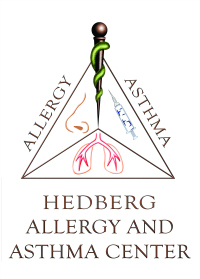 Are doctors still advising parents to avoid peanut products for a child’s first few years of life? What if my child is accidentally exposed to a food with peanuts in it? Would this make him more likely to develop an allergy?
Are doctors still advising parents to avoid peanut products for a child’s first few years of life? What if my child is accidentally exposed to a food with peanuts in it? Would this make him more likely to develop an allergy?
Response by Dr. Adesua O. Wejinya – Board Certified Allergist of Hedberg Allergy & Asthma Center
Physicians are no longer advising parents to avoid peanut products for the child’s first few years of life. There is no evidence that accidental exposure to peanuts early would increase the likelihood of development of a peanut allergy in a child with no known food allergies. On the contrary, recent scientific research has shown that peanut allergy can be prevented by introducing peanut-containing foods into the diet EARLY in life.
 Researchers conducted a clinical trial called Learning Early About Peanut Allergy (LEAP) with more than 600 infants considered to be at high risk of developing peanut allergy because they had severe eczema, egg allergy, or both. The scientists randomly divided the babies into two groups. One group was given peanut-containing foods to eat regularly, and the other group was told to avoid peanut-containing foods. They did this until they reached 5 years of age. By comparing the two groups, researchers found that regular consumption of peanut-containing foods beginning early in life reduced the risk of developing peanut allergy by 81 percent.
Researchers conducted a clinical trial called Learning Early About Peanut Allergy (LEAP) with more than 600 infants considered to be at high risk of developing peanut allergy because they had severe eczema, egg allergy, or both. The scientists randomly divided the babies into two groups. One group was given peanut-containing foods to eat regularly, and the other group was told to avoid peanut-containing foods. They did this until they reached 5 years of age. By comparing the two groups, researchers found that regular consumption of peanut-containing foods beginning early in life reduced the risk of developing peanut allergy by 81 percent.
Based on the strength of the LEAP findings, the National Institute of Allergy and Infectious Diseases (NIAID), part of the National Institutes of Health, worked with 25 professional organizations, federal agencies, and patient advocacy groups to develop clinical practice guidelines to address the prevention of peanut allergy. A panel of experts developed the Addendum Guidelines for the Prevention of Peanut Allergy based on the LEAP findings and other recent scientific research:
Guideline 1 recommends that if your infant has severe eczema, egg allergy, or both (conditions that increase the risk of peanut allergy), he or she should have peanut-containing foods introduced into the diet as early as 4 to 6 months of age. This will reduce the risk of developing peanut allergy.
Guideline 2 suggests that if your infant has mild to moderate eczema, he or she may have peanut-containing foods introduced into the diet around 6 months of age to reduce the risk of developing peanut allergy.
Guideline 3 suggests that if your infant has no eczema or any food allergy, you can freely introduce peanut-containing foods into his or her diet. This be done at home in an age-appropriate manner.*
*(Extracted from the Addendum Guidelines for the Prevention of Peanut Allergy in the United States. NIH. NIAID)
Development of a food allergy is multifactorial and complex. Not all mechanisms leading to development of a food allergy are completely understood but genetics amongst other factors does play a significant role. When in doubt about introduction of peanuts or other foods, please consult your pediatrician and a referral to an allergist may be necessary for further evaluation.
 Dr. Adesua O. Wejinya is one of the Board Certified Allergists practicing at Hedberg Allergy & Asthma Center, with locations in Rogers and Fayetteville. The clinic diagnoses and treats asthma, allergic rhinitis and other diseases of the upper and lower respiratory tract, drug and insect hypersensitivity, latex allergy, hives, allergic skin disease, recurrent infections and congenital immunologic deficiencies. Hedberg Allergy & Asthma Center was ranked No. 1 in the category of “Best Allergy Clinic” in the most recent Mom-Approved Awards, as voted by mothers in Northwest Arkansas. Click here to visit the clinic’s website or call 479-464-8887 (Rogers) or 479-301-8887 (Fayetteville) for more info.
Dr. Adesua O. Wejinya is one of the Board Certified Allergists practicing at Hedberg Allergy & Asthma Center, with locations in Rogers and Fayetteville. The clinic diagnoses and treats asthma, allergic rhinitis and other diseases of the upper and lower respiratory tract, drug and insect hypersensitivity, latex allergy, hives, allergic skin disease, recurrent infections and congenital immunologic deficiencies. Hedberg Allergy & Asthma Center was ranked No. 1 in the category of “Best Allergy Clinic” in the most recent Mom-Approved Awards, as voted by mothers in Northwest Arkansas. Click here to visit the clinic’s website or call 479-464-8887 (Rogers) or 479-301-8887 (Fayetteville) for more info.




